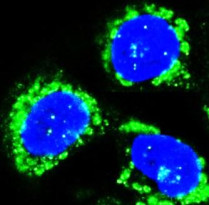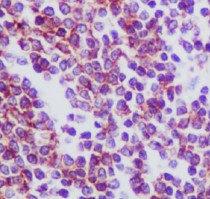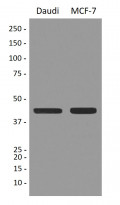ARG58043
anti-CD197 / CCR7 antibody
anti-CD197 / CCR7 antibody for ICC/IF,IHC-Formalin-fixed paraffin-embedded sections,Immunoprecipitation,Western blot and Human,Mouse,Rat
Overview
| Product Description | Rabbit Polyclonal antibody recognizes CD197 / CCR7 |
|---|---|
| Tested Reactivity | Hu, Ms, Rat |
| Tested Application | ICC/IF, IHC-P, IP, WB |
| Host | Rabbit |
| Clonality | Polyclonal |
| Isotype | IgG |
| Target Name | CD197 / CCR7 |
| Antigen Species | Human |
| Immunogen | Synthetic peptide derived from Human CD197 / CCR7. |
| Conjugation | Un-conjugated |
| Alternate Names | C-C chemokine receptor type 7; CD197; CD antigen CD197; CCR-7; CC-CKR-7; BLR2; CMKBR7; C-C CKR-7; MIP-3 beta receptor; EBV-induced G-protein coupled receptor 1; EBI1; Epstein-Barr virus-induced G-protein coupled receptor 1; CDw197 |
Application Instructions
| Application Suggestion |
|
||||||||||
|---|---|---|---|---|---|---|---|---|---|---|---|
| Application Note | * The dilutions indicate recommended starting dilutions and the optimal dilutions or concentrations should be determined by the scientist. | ||||||||||
| Positive Control | Daudi and MCF-7 | ||||||||||
| Observed Size | ~ 42 kDa |
Properties
| Form | Liquid |
|---|---|
| Purification | Affinity purified. |
| Buffer | PBS (pH 7.4), 0.02% Sodium azide and 50% Glycerol. |
| Preservative | 0.02% Sodium azide |
| Stabilizer | 50% Glycerol |
| Storage Instruction | For continuous use, store undiluted antibody at 2-8°C for up to a week. For long-term storage, aliquot and store at -20°C. Storage in frost free freezers is not recommended. Avoid repeated freeze/thaw cycles. Suggest spin the vial prior to opening. The antibody solution should be gently mixed before use. |
| Note | For laboratory research only, not for drug, diagnostic or other use. |
Bioinformation
| Database Links | |
|---|---|
| Gene Symbol | CCR7 |
| Gene Full Name | chemokine (C-C motif) receptor 7 |
| Background | The protein encoded by this gene is a member of the G protein-coupled receptor family. This receptor was identified as a gene induced by the Epstein-Barr virus (EBV), and is thought to be a mediator of EBV effects on B lymphocytes. This receptor is expressed in various lymphoid tissues and activates B and T lymphocytes. It has been shown to control the migration of memory T cells to inflamed tissues, as well as stimulate dendritic cell maturation. The chemokine (C-C motif) ligand 19 (CCL19/ECL) has been reported to be a specific ligand of this receptor. Signals mediated by this receptor regulate T cell homeostasis in lymph nodes, and may also function in the activation and polarization of T cells, and in chronic inflammation pathogenesis. Alternative splicing of this gene results in multiple transcript variants. [provided by RefSeq, Sep 2014] |
| Function | Receptor for the MIP-3-beta chemokine. Probable mediator of EBV effects on B-lymphocytes or of normal lymphocyte functions. [UniProt] |
| Cellular Localization | Cell membrane > Multi-pass membrane protein. [UniProt] |
| Calculated MW | 43 kDa |
Images (3) Click the Picture to Zoom In
-
ARG58043 anti-CD197 / CCR7 antibody ICC/IF image
Immunofluorescence: HeLa cells stained with ARG58043 anti-CD197 / CCR7 antibody (green). DAPI (blue) nuclear stain.
-
ARG58043 anti-CD197 / CCR7 antibody IHC-P image
Immunohistochemistry: Paraffin-embedded Human spleen tissue stained with ARG58043 anti-CD197 / CCR7 antibody.
-
ARG58043 anti-CD197 / CCR7 antibody WB image
Western blot: Daudi and MCF-7 cell lysates stained with ARG58043 anti-CD197 / CCR7 antibody.








